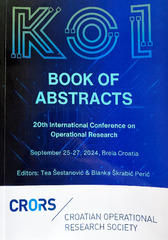Please use this identifier to cite or link to this item:
https://rfos.fon.bg.ac.rs/handle/123456789/2786| Title: | Navigating urban mobility: Clustering European cities based on shared vehicle systems complexity | Authors: | Uskoković, Veljko Drinjak, Nikola Jeremić, Veljko |
Keywords: | Sharing economy;shared mobility;sustainable transport;segmentation analysis | Issue Date: | Sep-2024 | Abstract: | The evolution of sharing economy and sustainability-focused models, driven by digital innovation, has prompted extensive research to dissect their essential components. Consequently, shared vehicle systems (SVS) and business models promote efficient and sustainable urban mobility by providing collaborative and accessible transportation solutions. This study aims to segment 173 European cities based on the number of bikes, cars, scooters and mopeds available to share via platforms, alongside population and area coverage metrics. The results should indicate which cities lead the way and the available shared vehicle portfolio in the leading ones. As a segmentation algorithm, K-means was chosen. Three clusters emerged: townies comprises 151 smnaller cities with abundant cars, solaris occupies solely Paris whose scores are the leading ones, while capitalis includes 21 larger cities excelling in the number of scooters. Significant disparities between clusters underscore the need for sustainable urban mobility strategies. The results unravel distinctness among SVS in European ities, providing valuable insights for future developments in urban mobility transformations. |
URI: | https://rfos.fon.bg.ac.rs/handle/123456789/2786 | ISSN: | 1849-5141 |
| Appears in Collections: | Radovi istraživača / Researchers’ publications |
Files in This Item:
| File | Description | Size | Format | |
|---|---|---|---|---|
| bitstream_4045.pdf | Uskokovic et al KOI 2024 | 1.55 MB | Adobe PDF |  View/Open |
Page view(s)
16
checked on Dec 28, 2025
Download(s)
4
checked on Dec 28, 2025
Google ScholarTM
Check
This item is licensed under a Creative Commons License

